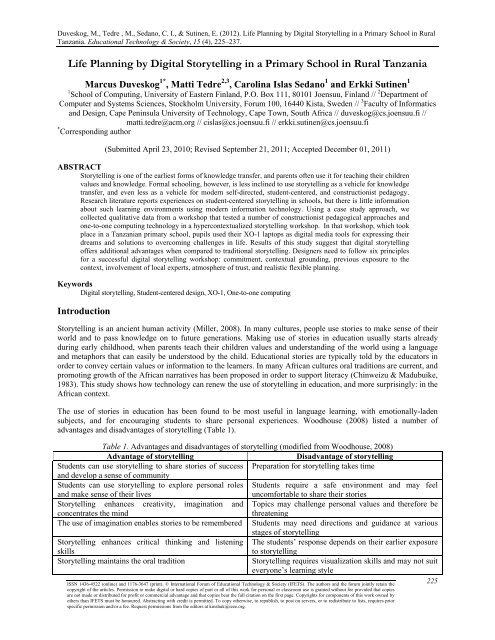October 2012 Volume 15 Number 4 - Educational Technology ...
October 2012 Volume 15 Number 4 - Educational Technology ...
October 2012 Volume 15 Number 4 - Educational Technology ...
You also want an ePaper? Increase the reach of your titles
YUMPU automatically turns print PDFs into web optimized ePapers that Google loves.
Duveskog, M., Tedre , M., Sedano, C. I., & Sutinen, E. (<strong>2012</strong>). Life Planning by Digital Storytelling in a Primary School in Rural<br />
Tanzania. <strong>Educational</strong> <strong>Technology</strong> & Society, <strong>15</strong> (4), 225–237.<br />
Life Planning by Digital Storytelling in a Primary School in Rural Tanzania<br />
Marcus Duveskog 1* , Matti Tedre 2,3 , Carolina Islas Sedano 1 and Erkki Sutinen 1<br />
1 School of Computing, University of Eastern Finland, P.O. Box 111, 80101 Joensuu, Finland // 2 Department of<br />
Computer and Systems Sciences, Stockholm University, Forum 100, 16440 Kista, Sweden // 3 Faculty of Informatics<br />
and Design, Cape Peninsula University of <strong>Technology</strong>, Cape Town, South Africa // duveskog@cs.joensuu.fi //<br />
matti.tedre@acm.org // cislas@cs.joensuu.fi // erkki.sutinen@cs.joensuu.fi<br />
* Corresponding author<br />
(Submitted April 23, 2010; Revised September 21, 2011; Accepted December 01, 2011)<br />
ABSTRACT<br />
Storytelling is one of the earliest forms of knowledge transfer, and parents often use it for teaching their children<br />
values and knowledge. Formal schooling, however, is less inclined to use storytelling as a vehicle for knowledge<br />
transfer, and even less as a vehicle for modern self-directed, student-centered, and constructionist pedagogy.<br />
Research literature reports experiences on student-centered storytelling in schools, but there is little information<br />
about such learning environments using modern information technology. Using a case study approach, we<br />
collected qualitative data from a workshop that tested a number of constructionist pedagogical approaches and<br />
one-to-one computing technology in a hypercontextualized storytelling workshop. In that workshop, which took<br />
place in a Tanzanian primary school, pupils used their XO-1 laptops as digital media tools for expressing their<br />
dreams and solutions to overcoming challenges in life. Results of this study suggest that digital storytelling<br />
offers additional advantages when compared to traditional storytelling. Designers need to follow six principles<br />
for a successful digital storytelling workshop: commitment, contextual grounding, previous exposure to the<br />
context, involvement of local experts, atmosphere of trust, and realistic flexible planning.<br />
Keywords<br />
Digital storytelling, Student-centered design, XO-1, One-to-one computing<br />
Introduction<br />
Storytelling is an ancient human activity (Miller, 2008). In many cultures, people use stories to make sense of their<br />
world and to pass knowledge on to future generations. Making use of stories in education usually starts already<br />
during early childhood, when parents teach their children values and understanding of the world using a language<br />
and metaphors that can easily be understood by the child. <strong>Educational</strong> stories are typically told by the educators in<br />
order to convey certain values or information to the learners. In many African cultures oral traditions are current, and<br />
promoting growth of the African narratives has been proposed in order to support literacy (Chinweizu & Madubuike,<br />
1983). This study shows how technology can renew the use of storytelling in education, and more surprisingly: in the<br />
African context.<br />
The use of stories in education has been found to be most useful in language learning, with emotionally-laden<br />
subjects, and for encouraging students to share personal experiences. Woodhouse (2008) listed a number of<br />
advantages and disadvantages of storytelling (Table 1).<br />
Table 1. Advantages and disadvantages of storytelling (modified from Woodhouse, 2008)<br />
Advantage of storytelling Disadvantage of storytelling<br />
Students can use storytelling to share stories of success<br />
and develop a sense of community<br />
Preparation for storytelling takes time<br />
Students can use storytelling to explore personal roles Students require a safe environment and may feel<br />
and make sense of their lives<br />
uncomfortable to share their stories<br />
Storytelling enhances creativity, imagination and Topics may challenge personal values and therefore be<br />
concentrates the mind<br />
threatening<br />
The use of imagination enables stories to be remembered Students may need directions and guidance at various<br />
stages of storytelling<br />
Storytelling enhances critical thinking and listening The students’ response depends on their earlier exposure<br />
skills<br />
to storytelling<br />
Storytelling maintains the oral tradition Storytelling requires visualization skills and may not suit<br />
everyone’s learning style<br />
225<br />
ISSN 1436-4522 (online) and 1176-3647 (print). © International Forum of <strong>Educational</strong> <strong>Technology</strong> & Society (IFETS). The authors and the forum jointly retain the<br />
copyright of the articles. Permission to make digital or hard copies of part or all of this work for personal or classroom use is granted without fee provided that copies<br />
are not made or distributed for profit or commercial advantage and that copies bear the full citation on the first page. Copyrights for components of this work owned by<br />
others than IFETS must be honoured. Abstracting with credit is permitted. To copy otherwise, to republish, to post on servers, or to redistribute to lists, requires prior<br />
specific permission and/or a fee. Request permissions from the editors at kinshuk@ieee.org.

















